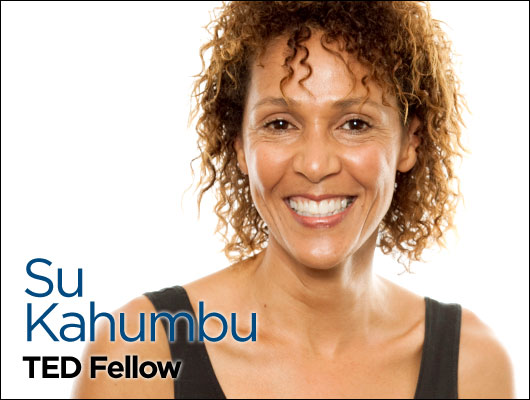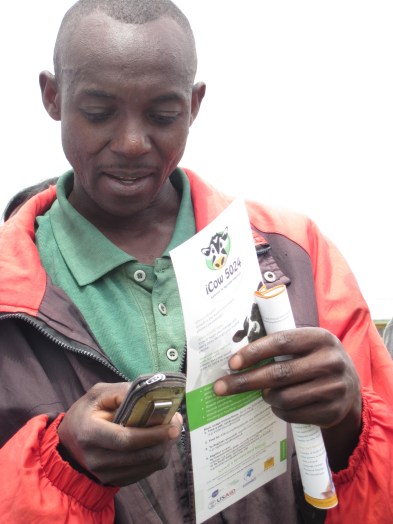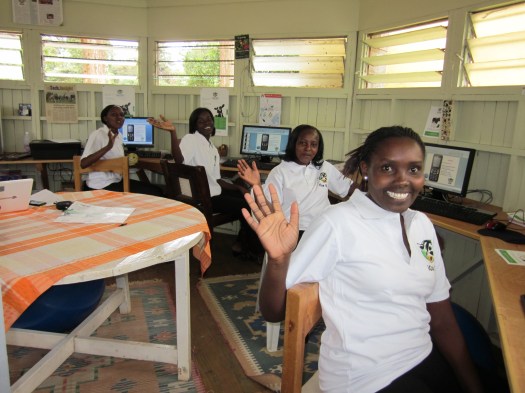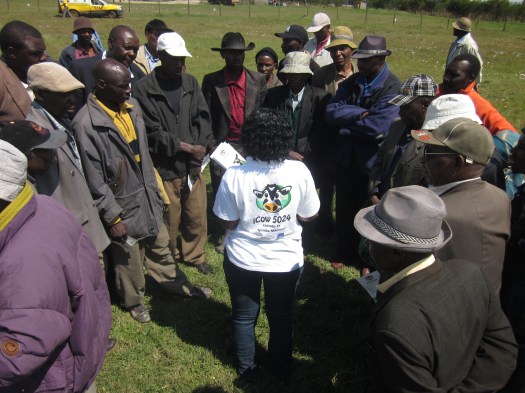
What does iCow do?
The iCow application essentially reminds small-scale dairy farmers in Kenya of important periods in gestation. This was information farmers previously had to acquire by contacting veterinary offices or artificial insemination providers. Now, via SMS, farmers register, inputting information about their livestock, and iCow pushes information and instructions to them, prompting them on what to do during vital gestation days. It also offers tips and information on feeding practices, disease control, and so on. Much of this information is delivered over SMS, but farmers may also speak to a live person in our customer care centre. Our farmers will never trust something that is absolutely virtual — they like to know there’s a voice at the other end of the phone if they need it!
But iCow has already grown from when we launched it in June 2011 with two features — the gestation calendar and a search directory to help farmers find nearby vets and artificial inseminators. Literally — within two days — farmers started asking for more features. So we started building them, such as the iCow marketplace.
How does the marketplace work?
Many farmers in the dairy sector often upgrade or sell their animals. There’s as much interest in selling your in-calf heifers as there is in selling milk to processors. But while the processors have done a fairly good job of networking on developing milk-aggregating posts, not as much has been done where farmers can actually find other farmers who are selling animals. iCow allows farmers to post notices of animals for sale on the platform, and then farmers across the country can find them. If you’re looking for a specific breed within a particular distance, you can find out easily whether there’s one for sale.
Also, some products don’t have a very well-developed value chain — say, goat’s milk. iCow enables farmers who have only have few goats and therefore small amounts of milk to find each other and aggregate their product so that it can be taken to market. Farmers can post produce for direct sale on the platform as well, of course.
But the platform goes beyond serving farmers’ needs.
iCow is the last mile to the farmer. And that is very, very powerful. For many organizations, government ministries, and other stakeholders in the agricultural sector, the only way to get out to the farm is either by vehicle or working in small projects with us around the country. iCow essentially networks farmers that would otherwise be very difficult to access. Right now, iCow has 80 percent geographical penetration across the country. This enables all of the other stakeholders access to those farmers. iCow is already becoming a tool that’s not only used by farmers, but also by government and other agricultural industry stakeholders.
For example, the platform allows farmers to alert the system immediately when there are disease outbreaks, allowing everyone react to it very quickly. The local authorities can then broadcast this news to all farmers on the platform in the affected region, telling them where and when to find vaccination services. Other stakeholders are using it to advertise agricultural field days or exhibitions in certain locations, or to offer financial services, for example.
You’ve said that one of the reasons you came up with the idea for iCow was to engage youth in agriculture. Why is this so important?
iCow is actually a small part of a much larger original idea that’s still in development — mKulima, a voice-based agricultural encyclopedia accessible via mobile phone.
I originally got the idea because I realized it’s crucial to involve young people in farming. The average age of farmers all over the world is high — in Kenya, it’s 48; in the United States, it’s upwards of about 55 — and as farmers retire, there aren’t enough people interested in the industry to replace them. This is one of the reasons why food production is decreasing.
In Kenya, some of the younger farmers coming in don’t have the required knowledge, as they didn’t grow up in a farming environment. The original idea was to be able to disseminate information to young farmers to support their work. I figured that mobile phones were the most direct way of engaging youth, as it’s a technology they’re all familiar with.
We’re also developing agricultural education products in video, which you can see on the website. The general idea is to develop content using media formats that would engage any interested youth, taking the opportunity to deepen interest or educate. In the future, we may develop materials in print media. Comic strips could be used as well.
What’s the status of iCow now, and of mKulima?
We’re about to enroll Africans in a very big way. So far, we’ve done lots of work on the ground with farmer groups, and internet networking. We hold events and hand out information — word of mouth is important. The farmers are very responsive, they’re very interested.
We have about 5,000 users across 34 counties, but we’re planning a mass rollout across mobile networks soon, and are raising funds for that. We plan to have more than 1 million farmers on the platform within two years. That may seem a lot, but Kenya is a nation of 40 million people, of which 70 percent of the country are involved in agriculture. The mKulima concept is still being developed — and will of course include information on vegetable crops as well as livestock — but it will all be rolled out under the iCow brand.
We’re thrilled with what we have now, but in terms of product development and features, there’s much, much more I want to add. It will take about five years to create a superb package of new features and expand the functionality of the ones already available.
Part of this is a usability issue. If a product comes onto the market with 70 features, there would be information overload and nobody would take it up. You have start simply and work your way up — especially as our initial target group was older. Youth pick things up much faster, but the older people on the farms at the moment need these services the most. We need to work at their pace.
What’s been your biggest challenge?
It’s the pace of technology. I’m a very impatient person — so when I come up with an idea, I want it done tomorrow. With the pace of innovation and technology, it just doesn’t happen, especially where you’re blazing new frontiers. It just doesn’t happen. And that, for me, has got to be the most frustrating thing.
How has being a TED Fellow changed the way you work?
Being a TED Fellow opened a lot of doors for me. If you’re a professional entrepreneur who’s very heavily involved in your work, there’s often not a lot of media focus on what you’re doing. And most entrepreneurs don’t make a lot of money — impact is what satisfies them, as well as results and scalability. Being a TED Fellow has generated a lot of media interest and general awareness, and boosted my confidence. It’s driven great partners in my direction, funding from people who just love the idea and want to support it.
The mentorship TED offers is really incredible, as well. They not only help us fine-tune our projects, but ourselves. They’ve helped me discover very clearly my weaknesses and strengths, and how to harness them to better support my vision. My coach spends a lot of time telling me to let go of some things, that I’m an obsessive person. She says, “You know what, if you’d let go of stuff, you can be more.” Half the time she’s just trying to ground me in a good way so that I can focus better on the big picture.
Then there are the other Fellows. I think there’s a competitive streak in all of us, and we are all just in awe of each other. That helps inspire and push us.
There are many aspiring social entrepreneurs out there who are trying to take their passion and ideas to the next level; what’s one piece of advice you would give them based on your own experience and successes?
If you’re developing a product, focus on getting a working prototype done. Getting people to believe in or even understand iCow was very difficult in the idea stage. The IT people didn’t understand agriculture, and the agriculture people didn’t understand IT. People in finance didn’t understand either! Sometimes you have to connect the dots just to explain what it is you’re doing. And the best way is to get a prototype out there and show people. And they’ll get it.



Comments (13)
Pingback: NBA Playoff Teams’ Seasons in Social Media [INFOGRAPHIC] - Entrepreneur News | Australian Society of Entrepreneurs
Pingback: The magnitude of mindfulness: Fellows Friday with David Gurman - Entrepreneur News | Australian Society of Entrepreneurs
Pingback: Development Initiatives - Engage. Empower. Eliminate Poverty
Pingback: Vacas conectadas ao celular | ::. ISVOR | Programa Da Vinci .::
Pingback: The magnitude of mindfulness: Fellows Friday with David Gurman | Krantenkoppen Tech
Pingback: African Social Networks Thrive in a Mobile Culture | wifimobile.org
Pingback: Went to my First Networking Event « Grace Wanene's Blog
Pingback: 2012: Most Popular African Social Networks rival Facebook – Review | Technology News, Blog, Social Media, Startups, Gadget Reviews, Mobiles & More
Pingback: African Social Networks Thrive in a Mobile Culture – personal technology advice
Pingback: Expand and expend daily :) « Hamster wheels
Pingback: Weekly Roundup « BRENTT Consulting